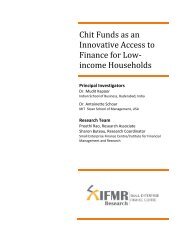Government of India Volume I: Analysis and Recommendations
Government of India Volume I: Analysis and Recommendations
Government of India Volume I: Analysis and Recommendations
Create successful ePaper yourself
Turn your PDF publications into a flip-book with our unique Google optimized e-Paper software.
ANNEXES<br />
2. General development <strong>of</strong> markets has to be distinguished from specific measures<br />
that need to be taken to achieve the financial inclusion agenda. The mechanisms<br />
for achieving financial inclusion in the field <strong>of</strong> insurance should be aligned with the<br />
decisions that the Commission may take for promoting inclusion in the banking<br />
sector.<br />
Prudential regulation<br />
3. Capital regulation<br />
(a) The capital resources maintained by insurance companies should be commensurate<br />
with the specific risks arising from their business activities. To<br />
achieve this, the primary law should provide that the prescribed capital requirements<br />
should be determined in a risk-based manner. Subject to this<br />
principle, the regulator will frame subordinate legislations to lay down the<br />
actual capital requirements <strong>and</strong> the process for computation <strong>of</strong> capital.<br />
(b) The regulator should also be permitted to prescribe the minimum capital requirement<br />
for the setting up <strong>of</strong> an insurance company, instead <strong>of</strong> having the<br />
rupees 100 crores requirement laid down in the primary law. This will allow the<br />
entry conditions to be revised from time to time without requiring an amendment<br />
to the law.<br />
4. The law should provide that insurance companies are permitted to hold different<br />
classes <strong>of</strong> capital. The classification <strong>of</strong> capital into different tiers will be done by the<br />
regulator through subordinate legislation. The regulator will also be empowered to<br />
restrict the extent to which insurers may rely on different tiers <strong>of</strong> capital for satisfying<br />
their capital requirements.<br />
5. Insurance law should not specify foreign investment limits for investments in the<br />
sector. As in all other sectors, this power should be with the Central <strong>Government</strong>.<br />
In making its determination, the government may consider adopting different FDI<br />
limits for different types <strong>of</strong> insurance activities. In particular, a higher limit may be<br />
considered for the health insurance sector to promote more robust growth in the<br />
sector.<br />
6. High-level principles relating to sound governance <strong>and</strong> management <strong>of</strong> insurance<br />
firms need to be enshrined in the law. The law should also m<strong>and</strong>ate self-assessment<br />
<strong>of</strong> solvency <strong>and</strong> risk pr<strong>of</strong>ile by insurers. The regulator should then use its supervisory<br />
powers to assess the adequacy <strong>and</strong> effectiveness <strong>of</strong> the measures adopted by<br />
the insurance company.<br />
7. The law should specify that investments are to be made as per the prudent person<br />
principle <strong>and</strong> quantitative investment requirements <strong>and</strong> restrictions should be<br />
removed from the primary law. To the extent necessary, the regulator should be<br />
empowered to specify appropriate investment norms through subordinate legislation.<br />
This power would be subject to certain restrictions to be specified under the<br />
law. Specifically, the regulator will not be able to prescribe the composition <strong>of</strong> the<br />
investment portfolio or the minimum levels <strong>of</strong> investment for any given category <strong>of</strong><br />
investment.<br />
8. The law should not prohibit insurance companies from investing overseas. Insurers<br />
may choose to globally diversify their portfolio in accordance with the prudent<br />
person principle <strong>and</strong> risk-based capital requirements. The regulator may, however,<br />
choose to set out reasonable limits on the currency mismatch risks that may be<br />
held by an insurer.<br />
Consumer Protection<br />
9. The law should set out the principles <strong>of</strong> consumer protection to be observed by the<br />
insurance service providers <strong>and</strong> the framework within which these principles may<br />
be implemented by the regulator.<br />
FINANCIAL SECTOR LEGISLATIVE REFORMS COMMISSION 167



